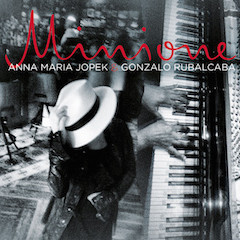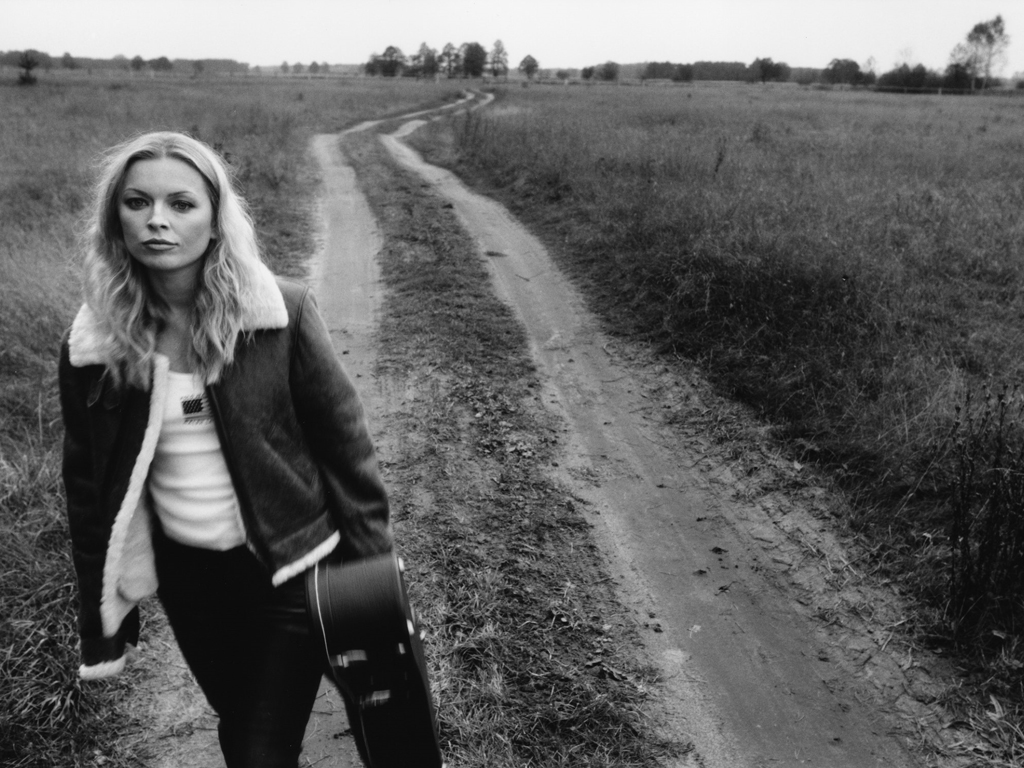
Anna Maria Jopek: ‘Music itself is the highest award for me and the greatest challenge. With so many questions remaining to be answered.’

MINIONE
Anna Maria Jopek with Gonzalo Rubalcaba
Universal Music Polska
Anna Maria Jopek is one of her native Poland’s musical treasures, and she in turn celebrates her Polish heritage both in interviews and in her music. But over the course of an award winning 20-year career, Ms. Jopek has exhibited unceasing musical wanderlust, spicing, enhancing and augmenting her original songs with the sounds and textures of music from other worlds. Her journey continues unabated on her new Universal Polska album, Minione, featuring the sultry singer-songwriter interpreting pre-war Polish tangos and other ‘30s tunes to the accompaniment of the master improvisational pianist Gonzalo Rubalcaba, a Cuban native, and his jazz trio featuring Ernesto Simpson on drums and Jose Armando Gola on bass—a triumvirate of Cuba’s most respected and sought-after musicians. The 11 songs range from flirty come-ons such as “Kogo Nasza Milość Obchodzi,” which leaves room for Rubalcaba to fashion a fanciful piano solo; the moody “Co Nam Zostalo Z Tych Lat,” wherein Ms. Jopek demonstrates the art of vocal seduction with an attack both vulnerable and yearning, as the trio backs her with spare, subtle atmospherics, such as those provided by Rubalcaba’s searching right-hand musings on a later, and seemingly companion tune, namely the tender instrumental “Co Nam Zostalo…Wybrzmienie.”
Official trailer 1 for Anna Maria Jopek’s new album, Minione, with pianist Gonzalo Rubalcaba
In the spirit of coexistence, the musicians veer away from the Polish repertoire to explore other territory, first in the classic “Besame Mucho,” done here in a slow, smoldering arrangement featuring Rubalcaba’s minimalist improvisations on the familiar melody, as Ms. Jopek hums—yes, hums–along dreamily with him in what may be the most sensuous version ever of this chestnut. The album ends on an introspective note, with a historically resonant song from 1933 Poland, “Rebeka,” originally a tango based on a Chasidic melody, but now, in the hands of Ms. Jopek and Rubalcaba, a completely interior, even wistful, ballad, as Ms. Jopek carefully, softly renders the lyrics that deal with the cultural divide between the Jewish community and the rest of the city, between two cultures. The lyrics to this and other songs are not translated, but the depth of feeling and the nuanced settings prove once again how music is a language all its own, transcending translation to speak to listeners’ hearts, directly and with power to evoke powerful feelings and indelible memories regardless of point of origin.
Official trailer 2 for Anna Maria Jopek’s new album, Minione, with pianist Gonzalo Rubalcaba
‘When I work with the artists coming from the musical backgrounds different to mine, I’m always delighted by their diversity,” Ms. Jopek says. “Everything that they bring in to the recording enriches me spiritually. I’m amazed of the immensity of beauty and truth on the crossroads of cultures and human sensibility. Music is the language of unity.
Official trailer 3 for Anna Maria Jopek’s new album, Minione, with Gonzalo Rubalcaba and drummer Ernesto Simpson
“Working on those old tangos was pure magic. Rarely can you come across the material of such charm, intense melancholy, mystery and eroticism. Recording with Gonzalo was sheer mysticism. The presence of ‘being’ in every note teaches you to be carefully attentive and humble.”
***

Minione is not Anna Marie Jopek’s first encounter with Gonzalo Rubalcaba. Back in October 2011 she made an audacious multi-cultural move by releasing three albums simultaneously, each one challenging listeners to accept the challenge she undertook in diving into fresh but uncharted musical waters. These included Polanna, Haiku and Sobremesa. Still available separately, all three have more recently been packaged together as Lustra in a book containing 100 photos documenting Ms. Jopek at work and at leisure, and in her own words, in the years from 2008 to 2011.
Recorded at the Radio Gdansk studio and completed in New York City, Polanna is described as “the search of the essence of Polish soul in music, in the arrangements of multiple Grammy Award winning Gil and Krzysztof Herdzin.” The band is comprised of Gonzalo Rubalcaba, Maria Pomianowska (“the great lady of Polish folk music”) and classical cellist Rafał Kwiatkowski. “The album takes a fresh look at both important and beautiful moments in the history of our music,” says Ms. Jopek.
Having played Japanese venues a number of times over the years, Ms. Jopek formalized her love of that country’s music in Haiku, an attempt to find common ground between Polish and Japanese music. Here she is accompanied by the noted Japanese jazz pianist Makoto Ozone, with a special guest appearance on bamboo flutes by Tomohiro Fukuhara from the Kabuki theater world. She may be from the other side of the planet, but the lightness, the air, in her voice makes it an ideal instrument for the delicacy common to Japanese music.
‘Dolina, O Mój Rozmarynie’ from Haiku, Anna Maria Jopek with Makoto Ozone
Arguably the most daring of the album triptych, Sobremesa is devoted to stories of Lisbon, the city Ms. Jopek calls her second home. The songs are a mix of her favorites from the Portuguese and Lusophone cultures. Among the guests are “the prince of Fado” Camané; charismatic voices from Cape Verde Island in Sara Tavares and Tito Paris; the legendary Portuguese singer Paulo de Carvalho; Angolan multi- instrumentalist and vocalist Yami; and the Brazilian composer and singer Ivan Lins. This album features three new compositions, and finds Ms. Jopek performing mainly in Portuguese, and also in Creole and Kimbundu languages. Sobremesa was recorded in Lisbon with the multicultural band created for this occasion.
Daring, yes; to her long-time followers, business as usual for Anna Maria Jopek. Even as she has embraced the music and culture of her native land, she seems always to have looked farther and across borders in following her muse. Only three years separate the abovementioned albums from two of her most important works, both from 2008, in the albums ID and Upojenie (the latter was actually released in 2002 but expanded with extra tracks for an international edition in 2008).
https://www.youtube.com/watch?v=44RIZRnvGhY
‘To, Co Nienazwane’ (‘What Is Not Named’), Anna Maria Jopek, from the album ID. An imprecise translation of the Polish lyrics: There were so many instances in my life when I was not able to find any adequate, precise words to capture such moments. And whatever is not named properly, vanishes. Whatever is not saved by the words of your language, eventually dissolves and loses its meaning. Becomes lost, irreplaceable, heads for oblivion. So let my tongue obey me and caress you with words, create in you that way and save you. What are the words to describe the heat of this look in your eyes? How can I translate into words this singular shiver of your lip that comes just once and disappears? How shall I write it all down, so your features remain alive and accurate and do not become just a memory in my diary and therefore–something entirely different?
ID, which went platinum in Poland within two weeks of its release, features an all-star cast of world music players. As Ms. Jopek’s website notes, “The Brazilian bossa nova genius Oscar Castro Neves meets serene ECM recording pianist from Norway Tord Gustavsen. An exotic voice of Tunesian oud virtuoso and vocalist Dhafer Youssef blends with brave and adventurous notes of Branford Marsalis’ soprano saxophone. Richard Bona’s trademark Douala vocals and bass lines coexist with sensual French singing by percussion wizard Mino Cinelu. Manu Katche and Christian Mc Bride provide powerful grooves… yet then there is this amazing, sophisticated vocal by Anna Maria that makes it all work. That makes this dialogue of such different cultures not only possible, but fascinating to observe. That makes this music unique, one of the kind. Personal.”
“All these people have been my inspiration for the last decade,” says Ms. Jopek. “It’s an amazing experience to have finally met them, to exchange energies and ideas, to learn from them and—hopefully–to create some original music with them in mind. I am Polish. I come from the vast meadows of central Poland, I’ve been brought up with its musical traditions, but it does not make my ID complete. Especially now, with the world getting so much smaller every single day. I truly believe that the new music might emerge from the coexistence of so many so different voices, influences, traditions, religions. By far, this is the most important work I’ve ever done.”
ID may indeed be her most important work as an artist, but her 2002 collaboration with Pat Metheny on Upojenie brought her to the attention of U.S. audiences in a big way. To be clear, Upojenie is a Pat Metheny album, but Ms. Jopek’s contribution was so substantial, in the nature of a true collaboration, that Metheny billed it as being by Pat Metheny & Anna Maria Jopek. In Metheny’s history, only legends Charlie Haden, Jim Hall and Brad Mehldau have received co-billing on a Metheny project.
Pat Metheny and Anna Maria Jopek, a live version of ‘Are You Going With Me?’ from the album Upojenie
That Upojenie happened at all, much less so successfully, is a story in and of itself, according to Ms. Jopek. She related an abridged version of how it all came together to Marco Losavio in an interview published at www.jazzitalia.net. In her words:
Marcin [Ms. Jopek’s pianist-producer husband Marcin Kydrynski) sent a proposal to Methane’s agent back in 1998 and received a polite note saying: the girl has a pleasant voice, but Pat Metheny doesn’t feel he might get involved in the project. Years later, encouraged by the Warner Music Poland office, we tried again. We actually drove three days from Warsaw to the Molde Festival in Norway in 2001, where Pat was an Artist in Residence. We met backstage and could hardly speak, we were so stunned by his very presence. Yet somehow we managed to speak up, pass him my Barefoot album and explain what we dreamt of. I figure we must have looked so convincing that Pat decided to at least not throw the album away immediately.
It took another year and a half before we got to the studio and no one would ever believe how many obstacles we faced. This was the most rewarding and beautiful time in our lives, yet at the same time the most exhausting. We hardly survived the tension and the suspense. When Pat eventually arrived in Warsaw for a week in October 2002, it all vanished—and the purest joy of making music with your greatest hero of all time remained. How works is another story. It would be wise to publish a book on that one day. It’s unlikely we will ever meet someone like him again. He’s from another world.
‘Czarne slowa (Black Words),’ Pat Metheny and Anna Maria Jopek, from Upojenie
In the Warsaw studio, with Kydrynski co-producing with Metheny, the duo married, as Allmusic.com’s Thom Jurek noted, “the guitarist’s signature meld of jazz, pop, and American forms with electronics, early folk melodies, classical melodies, and arrangements with exotic instrumentation and Jopek’s otherworldly but gentle voice.”
It is, altogether, rather amazing, endlessly listenable and laudably performed by some of Poland’s finest session players, including pianist Leszek Mozdzer. A version of Metheny’s “Are You Going With Me?” (from his album Offramp) is ethereal and riveting, a haunting experience built on eerie percussive effects, spectral voices and surprising shifts in texture before it elevates in spirit and in fact into a full-on warehouse jam propelled by Latin-ish percussion and Metheny’s dumbfounding classic trumpet sounding guitar solo played on the Roland GR-300 guitar synthesizer. “Mania Mienia (So May It Secretly Begin)” does indeed begin in understated fashion before slowly unfolding into a brisk tempo and searching vocal but eventually takes on a bit more heft as added voices enter and the arrangement at times adopts a Brasil ’66 feel with the added value being Metheny’s rich, solid-body fills augmenting Ms. Jopek’s measured singing. “Czarne Slowa (Black Words),” a Jopek original, is a deeply yearning bit, with Metheny subtly underpinning the vocal with discreet asides while leaving most of the atmospherics to Mozdzer. For sheer, unalloyed beauty and spiritual resonance, the assembled cast is at its finest and most restrained on the lovely Polish Christmas carol, “Lulajze Jezuniu,” with Metheny crafting a tender solo in between Ms. Jepko’s vocal wafting through the track like softly falling snow. In the end, Jurek summed up Upojenie best in his Allmusic.com review, advising “…those who have an interest in sophisticated pop singers from Stacey Kent to Inara George should consider this as well. Upojenie is international jazz as poetry in motion.”
Then in 2016 she realized another dream: to sing with Sting, who invited her to join him on a duet of “Fragile” on a Polish TV special promoting his album 57th & 9th, filmed on December 8 and broadcast on New Year’s day, 2017.
‘Fragile,’ Sting with Anna Maria Jopek on Polish TV, December 8, 2016, broadcast on New Year’s Day 2017
A classically trained pianist (from the age of six—“I became fascinated by Ravel, Bach, certain nostalgic pieces by Chopin. And I discovered Mozart, whose music also suited my physical abilities. He must have had small hands, like mine. These were great, yet tough times.”) whose parents were folk musicians, Ms. Jopek graduated from the Chopin Academy of Music in Warsaw, Poland. After briefly studying in Manhattan School of Music’s Jazz Department she decided not to play Mozart concertos anymore and trade her beloved Ravel for Keith Jarrett, and Philharmonic Hall for the less exalted world of clubs and theaters.
“Please do not file my music under jazz,” she says. “Nor under pop, folk..whatever. I embrace a lot of influences. Jazz is by far the most important in its freedom, its harmony and its sense of time, but I was brought up with the traditional Polish songs, hundreds of years old. I still feel I’m strongly influenced by the ethnic elements. Surely you find lots of them on each of my records. Perhaps what I do is equally fed by all three: jazz, folk and classical. In that order. So I’m kind of rooted here in all these Slavic landscapes and sounds.”
Yet, having won almost every prestigious award Poland has to offer, and others such as Michel Legrand’s Personal Award in Witebsk in 1994, Ms. Jopek remains humble and focused on her art, not her celebrity. “Music itself is the highest award for me,” she says emphatically, “and the greatest challenge. With so many questions remaining to be answered.”


